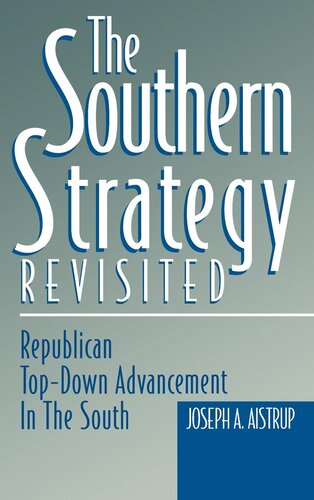

Most ebook files are in PDF format, so you can easily read them using various software such as Foxit Reader or directly on the Google Chrome browser.
Some ebook files are released by publishers in other formats such as .awz, .mobi, .epub, .fb2, etc. You may need to install specific software to read these formats on mobile/PC, such as Calibre.
Please read the tutorial at this link: https://ebookbell.com/faq
We offer FREE conversion to the popular formats you request; however, this may take some time. Therefore, right after payment, please email us, and we will try to provide the service as quickly as possible.
For some exceptional file formats or broken links (if any), please refrain from opening any disputes. Instead, email us first, and we will try to assist within a maximum of 6 hours.
EbookBell Team

5.0
28 reviewsThe 1994 elections represented a watershed year for southern Republicans. For the first time since Reconstruction, they gained control of a majority of national seats and governorships. Yet, despite these impressive gains, southern Republicans control only three of twenty-two state legislative chambers and 37 percent of state legislative seats. Joseph A. Aistrup addresses why this divergence between the national and subnational levels persists even after GOP national landslides in 1972, 1980, 1984, 1988, and 1994.
Explanations for this divergence lie in the interaction between the Republicans' "Southern Strategy" -a set of coherent ideological tactics designed to lure southern whites to support GOP candidates-and the Republicans' top-down party development efforts. Aistrup analyzes the historical evolution of the Republican Southern Strategy from Goldwater in 1961 to the "Contract with America" in 1994. Examining the roles of ideology, intra party politics, gerrymandering, and Democratic incumbency in Republican top-down advancement, he predicts the extent to which these will remain significant obstacles to GOP success in subnational elections after 1994.
Aistrup reveals the strengths and weaknesses of the Southern Strategy as it relates to candidate ideology and examines the influences of Republican victories in national and statewide offices on the party's subnational advancement. He shows a clear connection between Republican presidential success and southern Republican advancement in local elections.